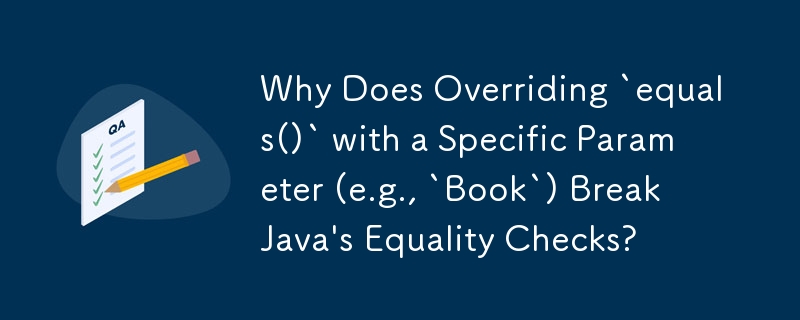 Java
Java
 javaTutorial
javaTutorial
 Why Does Overriding `equals()` with a Specific Parameter (e.g., `Book`) Break Java's Equality Checks?
Why Does Overriding `equals()` with a Specific Parameter (e.g., `Book`) Break Java's Equality Checks?
Why Does Overriding `equals()` with a Specific Parameter (e.g., `Book`) Break Java's Equality Checks?

Why Overriding Java's equals() Method with a Book Parameter Causes Issues
Overriding the equals() method is essential for implementing custom equality checks in Java. However, using a custom equals() method with a Book parameter instead of the standard equals(Object) method can lead to unexpected behavior.
Understanding the equals() Method
By default, Java defines the equals() method in the Object class that takes an Object parameter. If you want to override equals() in your custom class to compare objects of a specific type, you must adhere to the same signature, i.e., equals(Object).
Overriding vs. Overloading
Overriding is defined as providing a new implementation for a method inherited from a superclass. Overloading, on the other hand, is reusing a method name with different parameter types.
In the provided code, the public boolean equals(Book b) method constitutes overloading, not overriding. This is because it uses a different parameter type compared to the original equals(Object) method.
The Issue with Overloading
When you overload the equals() method, it breaks compatibility with the standard library classes that use equals(Object) for equality checks. For example, the ArrayList uses equals(Object) to determine whether an element is present in the list.
Therefore, using the overloaded equals(Book) method in the hasBook() method will cause contains() to fail when comparing Book objects instantiated with only an ID.
Solution
To resolve this issue, the equals() method should be overridden correctly by following the equals(Object) signature. This ensures compatibility with the standard library classes that rely on equals(Object) for equality checks.
The above is the detailed content of Why Does Overriding `equals()` with a Specific Parameter (e.g., `Book`) Break Java's Equality Checks?. For more information, please follow other related articles on the PHP Chinese website!

Hot AI Tools

Undresser.AI Undress
AI-powered app for creating realistic nude photos

AI Clothes Remover
Online AI tool for removing clothes from photos.

Undress AI Tool
Undress images for free

Clothoff.io
AI clothes remover

Video Face Swap
Swap faces in any video effortlessly with our completely free AI face swap tool!

Hot Article

Hot Tools

Notepad++7.3.1
Easy-to-use and free code editor

SublimeText3 Chinese version
Chinese version, very easy to use

Zend Studio 13.0.1
Powerful PHP integrated development environment

Dreamweaver CS6
Visual web development tools

SublimeText3 Mac version
God-level code editing software (SublimeText3)

Hot Topics
 Is the company's security software causing the application to fail to run? How to troubleshoot and solve it?
Apr 19, 2025 pm 04:51 PM
Is the company's security software causing the application to fail to run? How to troubleshoot and solve it?
Apr 19, 2025 pm 04:51 PM
Troubleshooting and solutions to the company's security software that causes some applications to not function properly. Many companies will deploy security software in order to ensure internal network security. ...
 How to simplify field mapping issues in system docking using MapStruct?
Apr 19, 2025 pm 06:21 PM
How to simplify field mapping issues in system docking using MapStruct?
Apr 19, 2025 pm 06:21 PM
Field mapping processing in system docking often encounters a difficult problem when performing system docking: how to effectively map the interface fields of system A...
 How to elegantly obtain entity class variable names to build database query conditions?
Apr 19, 2025 pm 11:42 PM
How to elegantly obtain entity class variable names to build database query conditions?
Apr 19, 2025 pm 11:42 PM
When using MyBatis-Plus or other ORM frameworks for database operations, it is often necessary to construct query conditions based on the attribute name of the entity class. If you manually every time...
 How do I convert names to numbers to implement sorting and maintain consistency in groups?
Apr 19, 2025 pm 11:30 PM
How do I convert names to numbers to implement sorting and maintain consistency in groups?
Apr 19, 2025 pm 11:30 PM
Solutions to convert names to numbers to implement sorting In many application scenarios, users may need to sort in groups, especially in one...
 How does IntelliJ IDEA identify the port number of a Spring Boot project without outputting a log?
Apr 19, 2025 pm 11:45 PM
How does IntelliJ IDEA identify the port number of a Spring Boot project without outputting a log?
Apr 19, 2025 pm 11:45 PM
Start Spring using IntelliJIDEAUltimate version...
 How to safely convert Java objects to arrays?
Apr 19, 2025 pm 11:33 PM
How to safely convert Java objects to arrays?
Apr 19, 2025 pm 11:33 PM
Conversion of Java Objects and Arrays: In-depth discussion of the risks and correct methods of cast type conversion Many Java beginners will encounter the conversion of an object into an array...
 E-commerce platform SKU and SPU database design: How to take into account both user-defined attributes and attributeless products?
Apr 19, 2025 pm 11:27 PM
E-commerce platform SKU and SPU database design: How to take into account both user-defined attributes and attributeless products?
Apr 19, 2025 pm 11:27 PM
Detailed explanation of the design of SKU and SPU tables on e-commerce platforms This article will discuss the database design issues of SKU and SPU in e-commerce platforms, especially how to deal with user-defined sales...
 How to elegantly get entity class variable name building query conditions when using TKMyBatis for database query?
Apr 19, 2025 pm 09:51 PM
How to elegantly get entity class variable name building query conditions when using TKMyBatis for database query?
Apr 19, 2025 pm 09:51 PM
When using TKMyBatis for database queries, how to gracefully get entity class variable names to build query conditions is a common problem. This article will pin...





